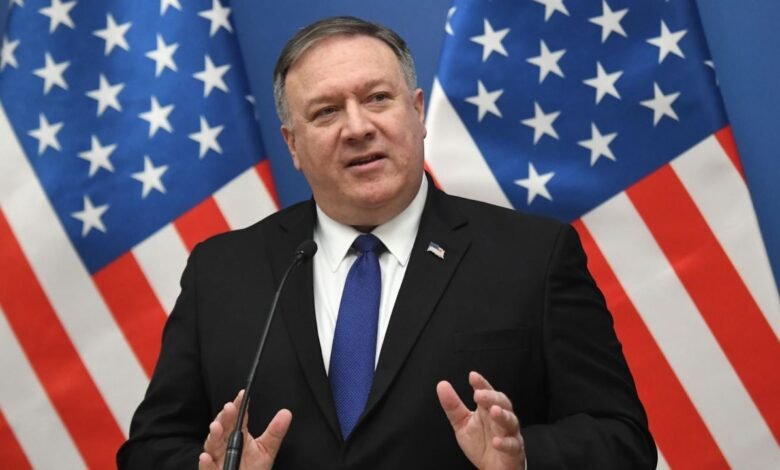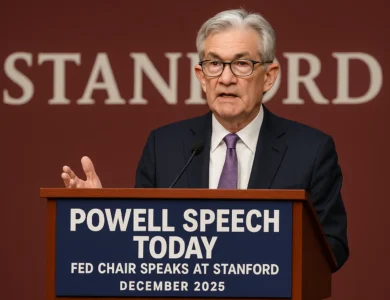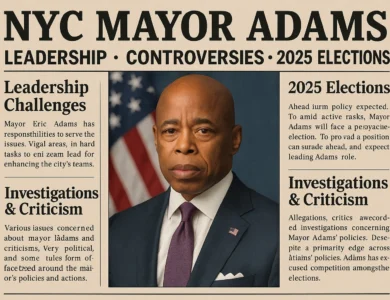
Mike Pompeo stands as one of the most influential figures in modern American politics and foreign policy. Serving as the 70th Secretary of State under President Donald Trump from 2018 to 2021, Pompeo has left an indelible mark on American diplomacy. His career trajectory—from military officer to CIA Director to the nation’s top diplomat—represents a unique journey through the highest levels of American government.
Today, Mike Pompeo continues to shape political discourse through academic appointments, public speaking, and policy advocacy. His recent transition to academia, combined with ongoing involvement in national security discussions, keeps him at the forefront of American political conversation.
Early Life and Military Background
From California to West Point
Born in Orange, California, Mike Pompeo’s roots trace back to Italian immigrants. His paternal great-grandparents emigrated from Pacentro, Italy, in the late 1800s, seeking the American dream that would eventually lead their descendant to the highest echelons of power.
Pompeo’s formative years were spent in Fountain Valley, California, where he graduated from Los Amigos High School in 1982. Even then, his competitive spirit shone through as a forward on the basketball team.
Military Service and West Point Excellence
In 1986, Pompeo graduated first in his class from the United States Military Academy at West Point, majoring in engineering management. This achievement foreshadowed his future success in both public and private sectors.
From 1986 to 1991, Pompeo served as an armor officer in the U.S. Army. His duties included:
- Tank platoon leader with the 2nd Squadron, 7th Cavalry
- Cavalry troop executive officer
- Squadron maintenance officer
- Service in West Germany during the Cold War’s final years
His time at West Point also introduced him to lifelong colleagues Brian Bulatao and Ulrich Brechbuhl, who would later form what some playfully call the “West Point Mafia”—a tight-knit circle that would rise to powerful government positions.
Business Career and Entry into Politics
Entrepreneurial Success
After leaving the military, Pompeo earned his Juris Doctor from Harvard Law School in 1994. He then co-founded Thayer Aerospace, demonstrating his business acumen outside the military sphere.
Congressional Career
Pompeo’s political career began when he was elected to represent Kansas’s 4th congressional district in 2010. During his time in Congress, he became known for his hawkish stance on national security issues, particularly regarding Iran.
He was a vocal critic of the 2015 Iran nuclear deal, arguing it gave Iran excessive latitude to enrich uranium. This position would later define much of his tenure as Secretary of State.
CIA Director: Intelligence Leadership
In January 2017, President Trump appointed Mike Pompeo as Director of the Central Intelligence Agency. His 15-month tenure at the CIA prepared him for the diplomatic challenges ahead.
As CIA Director, Pompeo:
- Rebuilt relationships between the intelligence community and the White House
- Participated in sensitive national security decisions
- Gained firsthand experience in international intelligence operations
- Developed expertise in geopolitical threats
Secretary of State: Diplomatic Achievements
The Abraham Accords
Perhaps Mike Pompeo’s most celebrated achievement as Secretary of State was his role in negotiating the Abraham Accords in 2020. These historic agreements normalized relations between Israel and several Arab nations, including:
- United Arab Emirates
- Bahrain
- Morocco
- Sudan
Pompeo identified three essential components to achieving these deals: demonstrating unwavering U.S. support for Israel, making clear Iran’s role as a destabilizing force, and convincing Arab Gulf nations that America would stand by them.
The accords represented a significant shift in Middle Eastern diplomacy and remain one of the most consequential foreign policy achievements of the Trump administration.
Hardline Iran Policy
Less than two weeks after becoming Secretary of State in April 2018, Pompeo oversaw the U.S. withdrawal from the Iran nuclear deal. His “maximum pressure” campaign against Iran included:
- Reimposing economic sanctions
- Designating Iran’s Revolutionary Guard as a terrorist organization
- Taking a firm “no enrichment” stance on uranium
This aggressive policy toward Iran would have lasting consequences, including alleged Iranian assassination plots against Pompeo himself.
Moving the U.S. Embassy to Jerusalem
Pompeo supported and implemented the controversial decision to move the U.S. Embassy in Israel from Tel Aviv to Jerusalem, fulfilling a long-standing campaign promise by President Trump.
China Relations
Pompeo took a confrontational approach toward China, addressing issues including:
- Trade imbalances
- Intellectual property theft
- Human rights violations in Xinjiang
- The origins of COVID-19
His speeches often framed the U.S.-China relationship as a fundamental competition between freedom and authoritarianism.
Controversies and Criticisms
Loyalty to Trump
Mike Pompeo was widely regarded as one of President Trump’s most loyal Cabinet members. Critics accused him of politicizing the State Department and prioritizing Trump’s interests over diplomatic norms.
He supported Trump’s efforts surrounding the 2020 presidential election, drawing criticism from career diplomats and foreign policy experts.
Saudi Arabia and Jamal Khashoggi
Pompeo maintained a close relationship with Saudi Crown Prince Mohammed bin Salman even after CIA assessments found him responsible for the 2018 murder of Washington Post journalist Jamal Khashoggi. Pompeo defended this relationship as necessary for U.S. interests in the Middle East, though he called the killing “horrific.”
International Criminal Court Threats
In March 2020, Pompeo threatened ICC staff members investigating potential U.S. war crimes in Afghanistan, warning of visa restrictions and other actions. This move drew international condemnation as an attempt to intimidate international justice officials.
Post-Government Career: 2021-2025
Think Tanks and Advocacy
After leaving government in January 2021, Mike Pompeo joined the Hudson Institute as a distinguished fellow. He later founded the Champion American Values PAC (CAVPAC) in June 2021 and launched the Pompeo Foundation in 2024.
Not Returning to Trump Administration
Despite speculation, President Trump announced in November 2024 that Mike Pompeo would not join his second administration. Trump stated he “very much enjoyed and appreciated working with” Pompeo, thanking him for his service.
Reports suggested that Tucker Carlson and Donald Trump Jr. opposed Pompeo’s return, with Carlson reportedly calling him a “warmonger.”
Security Detail Revoked
In a controversial move, President Trump revoked Pompeo’s security detail in January 2025, despite ongoing threats from Iran. This decision alarmed former intelligence officials who warned of credible Iranian assassination threats.
Intelligence sources reported in June 2025 that Iranian operatives came close to assassinating Pompeo during a 2022 visit to Paris, underscoring the continued danger he faces.
Current Activities and Academic Appointments
Columbia University
In February 2025, Mike Pompeo joined Columbia University as a distinguished fellow at its Institute of Global Politics. This appointment, running through February 2026, involves teaching courses on:
- Diplomacy
- Decision-making
- Organizational leadership
Columbia emphasized the importance of “dialogue across the aisle,” noting Pompeo’s appointment brings diverse perspectives to campus. Pompeo himself suggested he was hired to provide “a view that is very different than most of the faculty.”
Liberty University
In October 2025, Liberty University announced that Mike Pompeo would serve as senior executive director of the Center for Law & Government, with government professor Zane Richer as deputy director.
Pompeo expressed honor in joining Liberty, stating: “Throughout my career in public service, I’ve seen firsthand that America’s strength comes not just from our military might or economic power, but from our Judeo-Christian foundations.”
Speaking Engagements
Pompeo remains active on the speaking circuit, addressing topics including:
- American global leadership
- Middle Eastern conflicts
- National security challenges
- The importance of religious freedom
In May 2025, he warned at Harvard Kennedy School that America appears to be pulling back from its global leadership role, emphasizing that no other nation can champion democracy if America walks away.
Mike Pompeo’s Foreign Policy Philosophy
America First Diplomacy
Pompeo’s approach to foreign policy centers on putting American interests first while maintaining global engagement. He advocates for:
- Strong deterrence against adversaries
- Support for allies and partners
- Promoting religious liberty and human rights
- Confronting authoritarian regimes
Views on American Leadership
Despite criticism of interventionism, Pompeo maintains that American global leadership remains essential. As he stated: “If America doesn’t lead, the world is forlorn. There’s nobody. For good or for bad, it sits on our shoulders, and we should own that.”
Skepticism of International Institutions
Throughout his tenure, Pompeo demonstrated skepticism toward international organizations he viewed as undermining American sovereignty, including the International Criminal Court and certain United Nations bodies.
Personal Life and Characteristics
Mike Pompeo is known for his:
- Strong evangelical Christian faith
- West Point leadership values
- Direct communication style
- Work ethic and attention to detail
He underwent a significant weight loss transformation while serving as CIA Director, reportedly losing 90 pounds through diet and exercise.
Conclusion
Mike Pompeo’s impact on American foreign policy extends well beyond his government service. From his military beginnings to his time as CIA Director and Secretary of State, he has consistently advocated for a robust American presence on the world stage.
His achievements, particularly the Abraham Accords, have reshaped Middle Eastern diplomacy. His hardline stance on Iran and China continues to influence policy debates. And his transition to academia ensures his perspectives will shape the next generation of foreign policy leaders.
Whether viewed as a principled defender of American interests or a controversial figure who prioritized loyalty over diplomatic norms, Mike Pompeo remains a significant voice in discussions about America’s role in the world. His current academic positions at Columbia and Liberty Universities demonstrate his ongoing commitment to influencing public policy and international relations.
As global challenges evolve, Pompeo’s experiences and perspectives on American leadership, national security, and diplomacy will continue to inform policy discussions for years to come. His journey from a small-town California boy to one of America’s most consequential secretaries of state exemplifies the opportunities available in American public service—and the weighty responsibilities that come with them.
Read More: Cardano News Today: Q4’s Top Trending Cryptos






